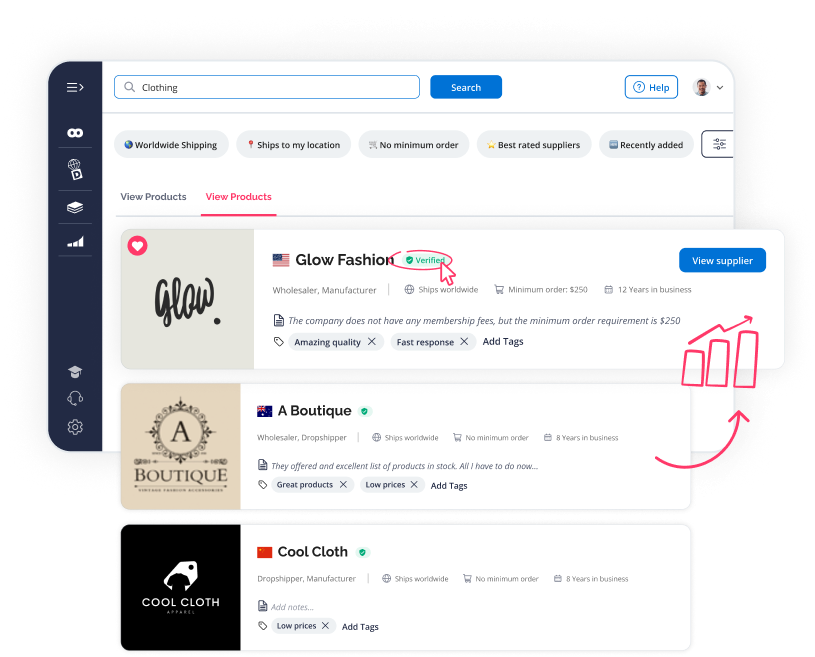Wholesale Scissors Suppliers for Ecommerce Stores
Scissors are an essential tool in various industries, from crafting and office supplies to sewing and hairdressing, making them a versatile addition to any product lineup. When sourcing suppliers, prioritize high-quality materials and craftsmanship for durability and precision, as well as a range of designs to cater to different user needs—such as ergonomic handles for comfort or specialized blades for unique applications. Additionally, don't hesitate to request samples to ensure that the products meet your standards before committing to larger orders

Here’s a selection of suppliers waiting for your call
Wholesale Supplier
 Verified
Verified
 Join to contact this supplier
Join to contact this supplier
 No Minimum Order
No Minimum Order
 14 Years in SaleHoo
14 Years in SaleHoo
Products stocked
About
Wholesale Supplier
 Verified
Verified
 Join to contact this supplier
Join to contact this supplier
 No Minimum Order
No Minimum Order
 32 Years in SaleHoo
32 Years in SaleHoo
Products stocked
About
Wholesale Supplier
 Verified
Verified
 Join to contact this supplier
Join to contact this supplier
 No Minimum Order
No Minimum Order
 9 Years in SaleHoo
9 Years in SaleHoo
Products stocked
About
Manufacturer Supplier
 Verified
Verified
 Join to contact this supplier
Join to contact this supplier
 No Minimum Order
No Minimum Order
 20 Years in SaleHoo
20 Years in SaleHoo
Products stocked
About
Manufacturer Supplier
 Verified
Verified
 Join to contact this supplier
Join to contact this supplier
 No Minimum Order
No Minimum Order
 6 Years in SaleHoo
6 Years in SaleHoo
Products stocked
About
Wholesale Supplier
 Verified
Verified
 Join to contact this supplier
Join to contact this supplier
 No Minimum Order
No Minimum Order
 7 Years in SaleHoo
7 Years in SaleHoo
Products stocked
About
Manufacturer Supplier
 Verified
Verified
 Join to contact this supplier
Join to contact this supplier
 No Minimum Order
No Minimum Order
 8 Years in SaleHoo
8 Years in SaleHoo
Products stocked
About
Wholesale Supplier
 Verified
Verified
 Join to contact this supplier
Join to contact this supplier
 No Minimum Order
No Minimum Order
 22 Years in SaleHoo
22 Years in SaleHoo
Products stocked
About
Manufacturer Supplier
 Verified
Verified
 Join to contact this supplier
Join to contact this supplier
 No Minimum Order
No Minimum Order
 10 Years in SaleHoo
10 Years in SaleHoo
Products stocked
About
Wholesale Supplier
 Verified
Verified
 Join to contact this supplier
Join to contact this supplier
 No Minimum Order
No Minimum Order
 10 Years in SaleHoo
10 Years in SaleHoo
Products stocked
About
Other product suppliers available...
Trusted by 137,000+ entrepreneurs worldwide

7-day trial today
suppliers in the USA and internationally.
Frequently Asked Questions
High-quality scissors are typically made from stainless steel, which offers durability and corrosion resistance. Additional materials like titanium coatings may be used for enhanced performance and sharpness.
Look for suppliers with ISO certifications, particularly ISO 9001 for quality management systems. Other important standards may include CE marking for safety regulations, especially for products intended for professional use.
Familiarize yourself with the safety standards and regulations specific to your target market, such as CPSIA for the U.S. or EN 71 for toys in Europe. Collaborate closely with your supplier to verify compliance before importing products.
Lead times can vary widely, typically ranging from 30 to 120 days based on the supplier's location, production capacity, and order volume. Always clarify lead times upfront and consider potential delays due to seasonal demand or material shortages.
Implement a stringent quality control process, including inspection of raw materials, in-line inspections during production, and final product testing. Establish clear criteria for performance, durability, and safety to ensure the received products meet your standards.


